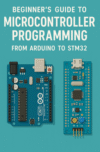Microcontroller technology is evolving at a rapid pace, and one of the biggest drivers of this change is the automotive industry. As vehicles become more connected, autonomous, and electrified, the demand for advanced, reliable, and efficient microcontrollers (MCUs) has surged. This shift is influencing not just automotive electronics, but the broader embedded systems landscape.
Automotive Demands Are Pushing MCU Boundaries
The modern automobile is essentially a network of sophisticated embedded systems. From engine control units and battery management systems to advanced driver-assistance systems (ADAS) and infotainment, each subsystem relies on MCUs that can handle high-speed processing, real-time control, and stringent safety requirements. These demands are prompting MCU manufacturers to push the limits in performance, energy efficiency, and integration.
Functional Safety and Reliability
In automotive applications, safety is paramount. Standards such as ISO 26262 require MCUs to incorporate hardware redundancy, fault detection, and fail-safe mechanisms. This focus on functional safety has led to innovations in lockstep CPU cores, error-correcting memory, and self-test capabilities—features that are now finding their way into MCUs for industrial and medical applications.
Integration of AI and Machine Learning
Automotive systems increasingly rely on AI for perception, decision-making, and predictive maintenance. This has driven the adoption of MCUs with integrated neural processing units (NPUs) and hardware accelerators capable of running machine learning models at the edge. The same technology is now enabling smarter consumer devices and industrial automation systems.
Enhanced Communication Capabilities
Modern vehicles require seamless communication between dozens of ECUs, sensors, and actuators. As a result, automotive MCUs are incorporating faster CAN FD, Ethernet, and LIN interfaces, along with secure communication features to protect against cyberattacks. These advancements benefit IoT and smart infrastructure projects as well.
Power Efficiency in Electrified Vehicles
Electric and hybrid vehicles place a premium on energy efficiency. Low-power MCU designs, advanced power domains, and intelligent sleep modes developed for automotive use are being applied to battery-powered embedded systems in other industries.
Impact Beyond the Automotive Sector
The innovations driven by automotive requirements are raising the bar for MCU capabilities across the board. Consumer electronics, robotics, renewable energy systems, and medical devices are all benefiting from the performance, safety, and connectivity improvements pioneered in the automotive sector.
End-to-End Integration in Automotive MCU Design
What sets automotive MCU development apart is the level of end-to-end system integration. Manufacturers work closely with OEMs to ensure that MCUs are optimized not only for hardware performance but also for software compatibility, cybersecurity, thermal management, and production scalability. This holistic approach is now influencing embedded system design in other fields, emphasizing that innovation happens fastest when hardware, software, and systems engineering advance together.



